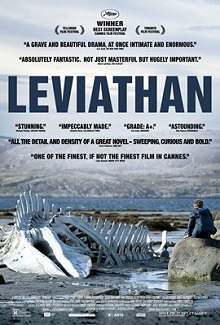
I haven’t mentioned this before but the reason why I’ve taken to adding the date of release behind each of the movies that I write about is that the same titles are used often enough that confusion is a real issue, and that is without even going into the question of remakes. As such this Russian film that was released last year has nothing to do with the American documentary that I wrote about not too long ago despite sharing the same title though the Biblical allusion in both cases are obvious.
Kolya welcomes Dima, an old friend from his army days and who is now a lawyer based in Moscow, to his home in a rural community in Russia. It turns out that Kolya’s home is being expropriated by the town’s mayor Vadim and he has enlisted Dima’s help to fight it. Not surprisingly, the legal battle goes poorly but Dima is confident that his dossier of Vadim’s past misdeeds should provide them with sufficient leverage to at least ensure that Kolya is fairly compensated for his property. At the same time, Kolya also has more problems closer to home as his teenage son, Roma, from his now deceased first wife hates his current wife Lilya while she in turn is attracted to Dima.
As you can imagine, this is a thoroughly depressing story. According to director Andrey Zvyagintsev, it was inspired by the real-life story of Marvin Heemeyer in the United States. I remember the case from a while back as the story of a man rampaging in his town with an armored bulldozer made international headlines. No such catharsis is offered here for the poor Kolya and the audience is forced to watch him being ground down mercilessly by the authorities, both secular and religious. Leviathan in this case is an obvious reference to the corrupt bureaucracy of the state but as a priest in the film suggests, it can also extend more generally to the futility of man’s struggle against the inherent unfairness of life, making this as even more miserable message. Contentment, he suggests, comes from humbly accepting one’s fate.
The film’s cinematography reinforces this theme with its liberal use of sweeping and epic views of the Kola Peninsula in which it is shot. Everything is seemingly giant-sized, from the mountain that hangs over the town, to the vast open landscapes where they go to shoot for fun, to even the massive skeletons of beached whales on the coast. The camera delights in showing how the people are insignificant figures in comparison. Less obviously, I also loved that Vadim’s skulduggery are all performed in the cold light of day. When he calls his cronies together to plot against Kolya, it is in a bright, modern conference room. Similarly he and his henchmen don’t hesitate to abduct Dima in broad daylight, just to show how completely he owns the town and how sincerely he believes that it is Kolya who is in the wrong for not knowing his proper place.
Other highlights for me include how the film marches to a story beat that is off kilter enough from what I’m used to that it manages to constantly surprise me while still serving the story perfectly. Performances are great throughout and I especially appreciated the slice-of-life scenes that show Kolya interacting with his friends. The only flaws that I can detect is that the film is perhaps a bit too unsubtle in its messaging and that the story of a lone man struggling futilely against the elite isn’t new. Still this is an undeniably powerful film that feels both honest and authentically Russian.
One thought on “Leviathan (2014)”